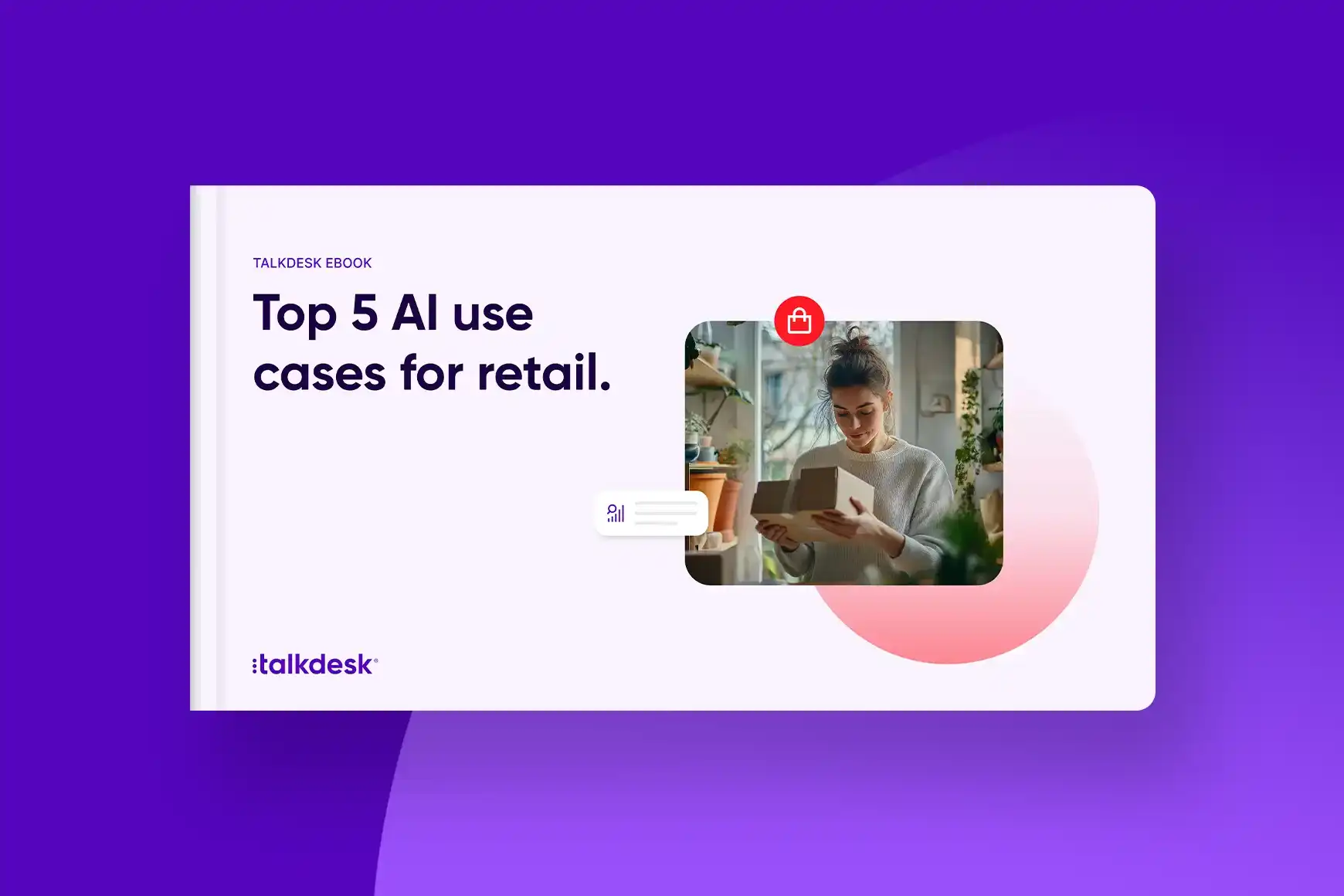AI holiday shopping 2025: 75% of consumers will use AI to find deals

By Michael Klein
0 min read

The 2025 holiday shopping forecast shows one thing clearly: AI is the invisible engine of retail, powering how consumers discover value, make choices, and build trust.
According to Talkdesk’s third annual AI Holiday Shopping Report, three out of four consumers (75%) will use AI to find deals this season, up from 66% in 2024. What started as a way to make shopping easier is becoming the foundation for how shoppers explore, choose, and buy. Consumers are also going into this holiday season more optimistic about AI than ever before. They believe it makes them happier (69%) and less anxious (70%), indicating that technology is now an emotional part of the shopping experience.
The key point this year isn’t about AI itself but how quickly shoppers have made it part of their decisions. For CX leaders, these findings mark a turning point. AI-powered shopping, more than a differentiator, is a standard for customer expectations. The next question is how far consumers’ confidence in AI will take them.

Holiday shopping trends 2025: Growing confidence in AI.
Shoppers have crossed the line from experimenting with AI to expecting it, and that shift is redefining what great retail experiences look like. Consumers are embracing AI as a trusted companion this holiday season:
-
67% plan to use AI for gift ideas (up from 54% last year).
-
78% say AI helps them save money (+4 points from last year)
-
73% believe it reduces the likelihood of returns (+4 points from last year).
In just one year, AI has shifted from being a shiny new tool to a holiday shopping essential and has become a key driver of relationships. It helps customers feel capable and in control, precisely what a great customer experience is meant to achieve.
The trust contract: Transparency in AI holiday shopping.
If last year was about getting comfortable with AI, this year is about getting comfortable with how it’s used. Shoppers aren’t questioning whether AI belongs in retail anymore; they are questioning how transparent brands are about their use of it. Consumers may welcome AI, but they also want clarity.
The survey reveals a clear expectation shift:
-
84% of consumers want to know when AI is being used.
-
60% want stricter oversight and standards.
-
Many are still open to sharing data if the value is obvious: 68% will do so for discounts, and 66% for loyalty points.
Consumers are saying, “I’ll trust AI if you trust me with transparency.” Retailers often talk about building trust, but trust in an AI-driven world provides clarity in addition to privacy. When customers understand how AI powers their recommendations, price alerts, or delivery updates, they don’t feel surveilled; they feel seen. AI that is visible and explainable is a clear competitive advantage.
AI adoption in retail: The leaders are scaling fast.
If consumers are embracing AI with confidence, retailers are meeting them with conviction. The latest numbers indicate that AI adoption in retail has progressed to full-scale integration across all operations.
-
Predictive analytics: 85% (+24 points YoY). Retailers are moving from intuition to insight, using data to forecast demand, manage inventory, and plan more targeted promotions.
-
AI agents for shopping: 83% (+24 points). AI is now driving discovery and conversion, guiding customers to the right product faster and more intuitively.
-
AI agents for customer service: 79% (+21 points). Service is becoming continuous, with AI resolving questions instantly and freeing human teams for more complex interactions.
-
Personalized pricing and promotions: 63% (+12 points). Retailers are beginning to tailor offers in real time, turning scale into personalization.
And they’re seeing measurable payoff:
-
80% expect higher holiday sales, proving that AI is not just efficient but revenue-generating.
-
80% see a stronger competitive edge, indicating that early adopters are widening the gap with laggards.
-
79% cite improved customer loyalty, showing that personalization and responsiveness are deepening relationships, not just transactions.
AI adoption in retail is the driving force behind forecasting, engagement, and loyalty. However, transparency hasn’t kept pace with adoption, as 92% of retailers say they use AI responsibly, but only half tell customers when it’s active. As adoption accelerates, communication must follow because how retailers talk about AI matters as much as how they use it.
The risks of standing still: Why late AI adoption hurts holiday performance.
While some retailers are scaling AI with confidence, others are taking a more cautious path, choosing to observe rather than invest. The data suggests that this caution is becoming more common:
-
73% of retailers not leveraging AI aren’t worried about losing sales to AI-enabled competitors (up from 41%).
-
71% of those retailers aren’t concerned about offering a lower-quality experience (up from 39%).
This mindset reflects a slower, more measured approach to transformation. Many retailers are watching the adoption of AI unfold around them and waiting to see clearer evidence of value before accelerating their own plans.
For others, the hesitation comes from unanswered questions, rather than resistance to AI:
-
71% remain unsure about AI’s return on investment.
-
66% still cite privacy concerns.
Retailers want to understand how AI can drive tangible business outcomes while protecting customer data and brand reputation.
When asked what could change their minds, their answers point to a need for guidance:
-
53% say greater transparency would help.
-
41% want clearer regulations.
The next step for the industry, in addition to scaling adoption, is building clarity and confidence. Progress will depend as much on communication and responsible frameworks as on innovation itself.
AI-powered shopping and the human element.
The next evolution of AI-powered shopping isn’t about replacing people but amplifying what makes them indispensable.
By handling routine tasks and surfacing real-time insights, AI frees retail teams to focus on what customers value most: empathy, understanding, and problem-solving.
-
Predictive analytics help teams anticipate needs before customers voice them.
-
AI agents resolve issues instantly, allowing associates to focus on more complex conversations rather than mundane tasks.
-
Personalization makes the customer experience and offers more relevant and timely, turning data into meaningful value.
AI works quietly in the background, removing friction from the journey so the business can focus on what builds revenue, trust, and loyalty. The smartest retailers are designing their AI strategies around this principle. They don’t see technology as a replacement for service, but as a way to scale attentiveness, not eliminate it. Because even as algorithms learn faster, it’s still empathy that earns loyalty. AI helps teams deliver it at the speed and scale modern retail demands.
Holiday shopping trends 2025: Rethinking leadership with AI.
This year’s AI holiday shopping forecast reveals more than shifting shopping habits; they show a new level of maturity in how consumers and retailers relate to technology.
AI is going from optional to expected.
AI is no longer something shoppers opt into, but something they assume will be part of their experience. From finding deals to discovering gifts, AI is woven into how they make choices and feel confident about them. For retailers, that ubiquity raises the bar: experiences that don’t feel intelligently connected may soon feel incomplete.
Retailer adoption has skyrocketed.
In just one year, AI has moved from pilot to practice across the retail ecosystem. Leaders are using it to predict, personalize, and perform at a new scale. But as technology becomes standard, differentiation will come not from who uses AI, but from who uses it well—with intention, creativity, and empathy.
Trust and transparency are still lagging behind.
This is retail’s unfinished business. Customers may embrace AI, but they still want to understand it. They’re asking brands to be clear, to show how AI helps, not just that it’s there. The industry’s next advantage won’t come from faster adoption, but from earned confidence.
Retail has always thrived on anticipation, knowing what customers need before they do. In 2025, AI makes that intuition limitless. The challenge now is to wield it wisely: to make intelligence feel personal, to turn automation into trust, and to use data not just to sell, but to serve.

AI-powered shopping FAQs.
Find the most common questions about AI-powered shopping trends.
The 2025 holiday shopping season is defined by the growing role of AI in shaping how consumers browse, buy, and trust. Three out of four shoppers (75%) plan to use AI to find deals, and two-thirds will use it for gift ideas. AI is no longer a novelty but a baseline expectation. Consumers say AI makes them feel happier, less anxious, and more in control, indicating that technology is now part of the emotional shopping experience.
During holiday shopping, consumers aren’t just using AI to save time, they’re using it to shop smarter and with more confidence. Shoppers rely on AI to surface personalized recommendations and optimize spending. This shift means AI is influencing both the rational and emotional sides of the purchase journey, helping customers feel supported and capable while navigating a busy shopping season.
AI-powered shopping allows retailers to create experiences that are personalized, predictive, and frictionless. AI can handle repetitive tasks such as product discovery, pricing optimization, and customer service inquiries, freeing human teams to focus on more complex tasks. The result is a more natural blend of efficiency and human connection, where technology amplifies service rather than replacing it.
AI adoption in retail has accelerated dramatically over the past year. For retailers already using AI, its usage has expanded across more areas. According to the Talkdesk third annual AI Holiday Shopping Report:
- 85% of retailers now use predictive analytics to forecast demand.
- 83% use AI agents for shopping assistance.
- 79% use AI agents for customer service.
- 63% have adopted personalized pricing and promotions.
The payoff is clear: 80% report higher holiday sales, stronger customer loyalty, and a sharper competitive edge. AI is becoming the connective system behind forecasting, engagement, and customer retention.
As AI becomes more embedded in retail, trust and transparency are essential. While 92% of retailers say they use AI responsibly, only half disclose when it’s being used. Consumers are asking brands to be open, to show how AI enhances their experience, and why it adds value. When customers understand how AI supports their journey, they feel seen rather than watched.




